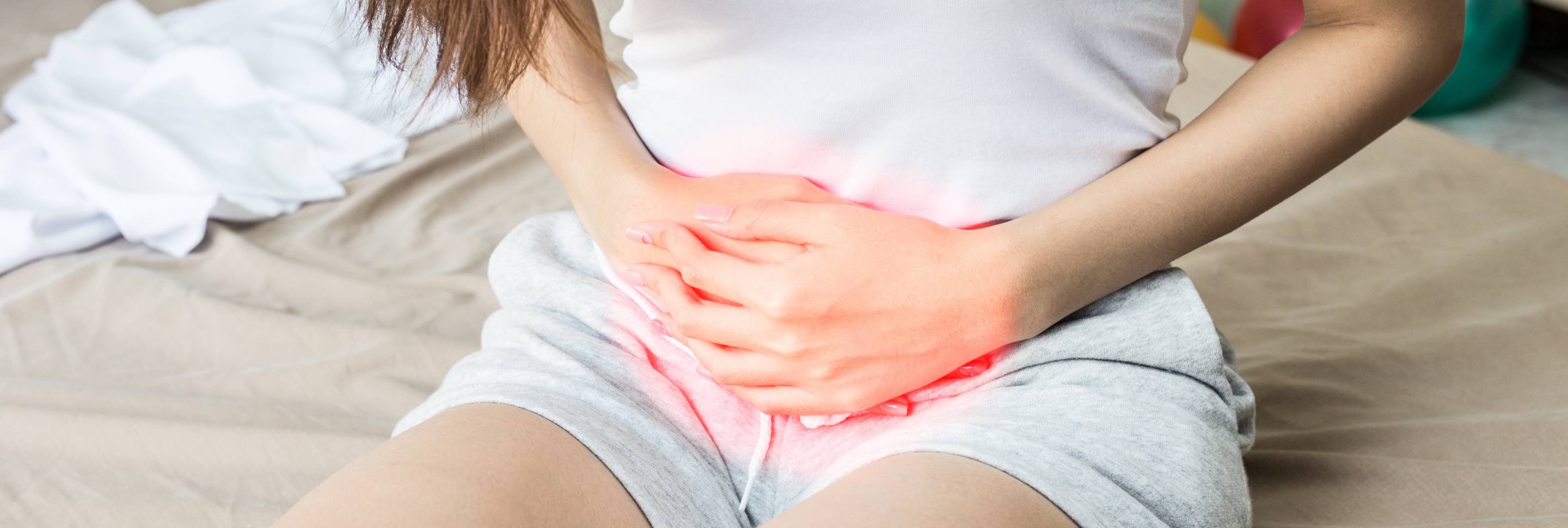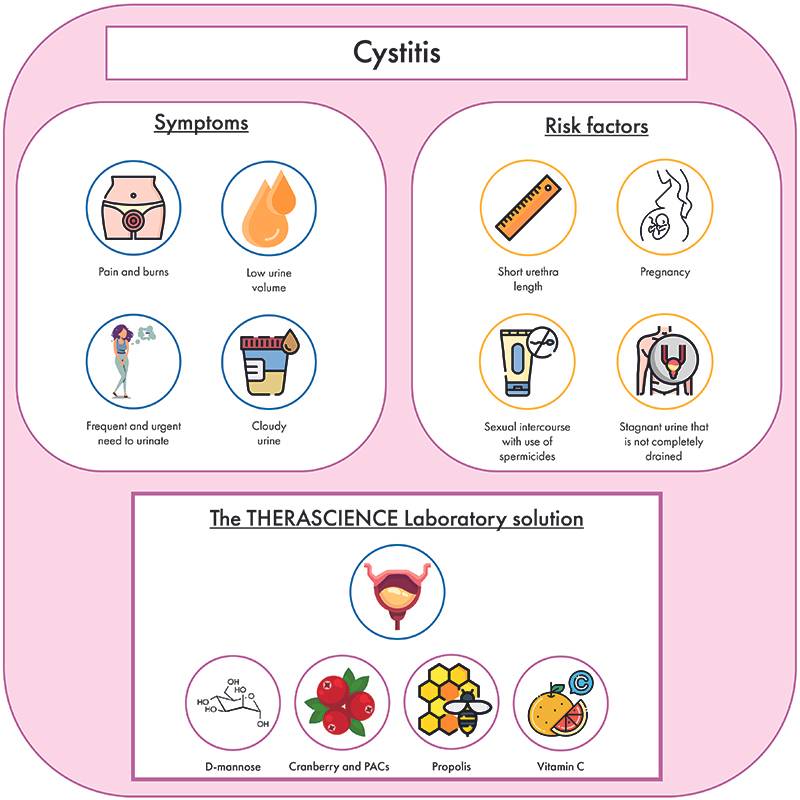
Say goodbye to cystitis !
Cystitis is a bacterial urinary infection that mainly affects women. It is estimated that one woman in two is affected by cystitis at least once in her life (NDC: source AFSSAPS). Particularly disturbing, this infection is characterised by significant urinary discomfort, accompanied by pain and inflammation of the bladder wall. Fortunately, natural solutions exist to prevent and accompany cystitis.
The big culprit behind cystitis: E. coli bacteria
In 90% of cases, cystitis is caused by Escherichia coli (E. coli) bacteria. Cystitis occurs when these bacteria, which are naturally present in the digestive tract (colon, rectum), migrate to the bladder via the urethra.
E. coli has adhesion proteins called fimbriae (FimH), which give it the ability to attach to the bladder wall. The fimbriae bind to mannosylated glycoproteins on the bladder wall, allowing the bacteria to remain in the bladder instead of being passed out in the urine. Once attached, the bacteria can then multiply and colonise the bladder and urinary tract.
Cystitis can manifest itself in different ways: pain and burning during urination, a feeling of not being able to hold it in, low urine volume and frequent urination (pollakiuria), a feeling of heaviness in the lower abdomen, cloudy urine with an unusual smell.
Antibiotics are used to treat cystitis in order to eliminate the bacteria. However, it is common for cystitis to recur and for the number of infectious episodes to be at least 3 to 4 per year. This is known as chronic or recurrent cystitis. The repetition of cystitis can be explained by the fact that the pathogens not eliminated by antibiotics can remain hidden inside the cells.
This is why it is essential to act in prevention of cystitis through Physionutrition in order to avoid the development of a new infection.
Several factors have been identified that may increase the risk of developing cystitis. These include the use of spermicides, which destabilise the vaginal flora during sexual intercourse, and the short length of the female urethra, which makes it easier for bacteria to enter the bladder. It is also known that between 1 and 4% of pregnant women develop cystitis during pregnancy. The onset of infection is linked in particular to the increase in volume of the uterus, which results in compression of the bladder, this compression favouring the retention of urine and poor emptying of the bladder.
The role of Physionutrition
Urinary tract infections are usually treated with antibiotics. However, due to the increasing development of multi-resistant strains, the use of alternative and complementary remedies is (more than ever) necessary.
Furthermore, it is now clearly established that the repeated and excessive use of antibiotics disrupts the endogenous microbiota, in particular the gastrointestinal and vaginal flora. The search for alternative approaches is therefore a necessity. Among the most commonly proposed natural alternatives that have proven their effectiveness are:
- D-Mannose
D-mannose is a sugar related to glucose. It is naturally present in many fruits and vegetables, and in small amounts in the human body. D-mannose is used as a lure. It is used as a bait to capture E. coli bacteria in the bladder. By binding to fimbriae, D-mannose saturates adhesins (bacterial adhesion proteins) and prevents them from interacting with urinary glycoproteins associated with mannose derivatives. Exogenous D-mannose thus prevents the attachment of E. coli to the bladder wall1,2, and also unhooks bacteria already attached to the bladder wall3.
- PACS from cranberry extract
Proanthocyanidins (PACs), whose effective dose has been scientifically demonstrated to be 36 mg per day, help to reduce the production of bacterial adhesion proteins and deform the bacterial wall4. PACs thus prevent the interaction between fimbriae and the urothelial cell wall, thus promoting the elimination of bacteria via the urinary tract5,6.
- Propolis
Propolis, a plant substance produced by bees, contains active molecules called galangins. Galangins cause disruption and lysis of the membrane and (fragmentation and disintegration) of the bacterial wall6. Propolis also reduces the adhesion of E. coli to urothelial cells, ensures their elimination through urine8 and thus prevents biofilm formation by bacteria9, an action reinforced by PACs10,11.
- Vitamin C
A vitamin well known for its antioxidant and immune stimulating properties, vitamin C is involved in stimulating the production of NO (nitric oxide) and acidifying the urine, thus creating an unfavourable environment for bacterial growth12,13.
PHYSIOMANCE Cyscomplex from THERASCIENCE Laboratory
To prevent and support acute and chronic cystitis, the THERASCIENCE Laboratory has formulated PHYSIOMANCE Cyscomplex, a synergistic association of 4 bio-actives.
PHYSIOMANCE Cyscomplex is an ideally dosed formula which provides 3.0 g of D-Mannose, 276.9 mg of cranberry extract titrated to 36.0 mg of proanthocyanidols (PACs), 400.0 mg of propolis extract titrated to galangins and 200.0 mg of vitamin C representing 250% of the Reference Intakes (RA), for 2 sachets.

Bibliography :
- De Nunzio C, Bartoletti R, et al. Antibiotics (Basel). 2021;10(4):373.
- Pani A, Valeria L, et al. J Chemother. 2022;1-6.
- Ala-Jaakkola R, Laitila A, et al. Nutr J. 2022;21(1):18.
- Occhipinti, Andrea et al. Urology journal. 2016;vol. 13,2 2640-9. 16
- Asma B, Vicky L, et al. BMC Urol. 2018;18(1):29.
- Xia JY, Yang C, et al. PLoS One. 2021;16(9):e0256992
- Almuhayawi MS. Saudi J Biol Sci. 2020;27(11):3079-3086.
- Przybyłek I, Karpiński TM. Molecules. 2019;24(11):2047
- Lavigne JP, Ranfaing J, et al. Antibiotics (Basel). 2020;9(11):739.
- Ranfaing J, Dunyach-Remy C, et al. PLoS One. 2018;13(8):e0202609
- Bruyère F, Azzouzi AR, et al. Urol Int. 2019;103(1):41-48.
- Carlsson S, Wiklund NP, et al. Nitric Oxide. 2001;5(6):580-586.
- Carr AC, Maggini S. Nutrients. 2017;9(11):1211.











